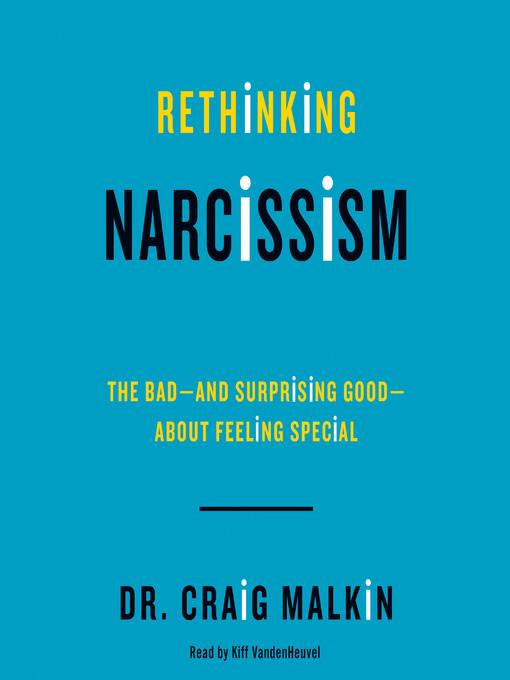
Rethinking Narcissism
The Bad—and Surprising Good—About Feeling Special
کتاب های مرتبط
- اطلاعات
- نقد و بررسی
- دیدگاه کاربران
نقد و بررسی

April 20, 2015
This wide-ranging discussion aims to absolve narcissism of its negative reputation. Psychologist Malkin makes no attempt to rigidly define narcissism, instead expanding the term into one that encompasses many different meanings. Readers are presented with a range of features broad enough to include almost anyone. Malkin delves into the Greek myth of Narcissus, which inspires him to propose a new category of “subtle narcissists” he calls echoists. Supplementing fable with modern anecdote, he also addresses the more familiar subject of modern technology’s influence on personality traits. Even if narcissism has come to be known as an affliction, it proves here to offer a range of adaptive benefits, collectively described as “healthy narcissism.” An inset quiz allows readers to discover where they fall on narcissism’s fluid continuum. Such a spectrum is perhaps too slippery: Malkin’s newly liberal definition may make narcissism too flexible a term to be very useful. Yet this is, importantly, a book that will have readers rethinking themselves and, paradoxically, those around them. Agent: Miriam Altshuler, Miriam Altshuler Literary Agency.

May 1, 2015
Can narcissism, the love one holds for his or her self-image, really be beneficial and necessary to develop a healthy self? Malkin, a clinical psychologist and regular contributor to publications such as Psychology Today, elegantly untangles the issues for the reader. After a concise introduction to narcissism, he presents the narcissism spectrum: a gradation of narcissism from 0 to 10. At the center lies healthy narcissism: people who safely depend on others and who can develop caring relationships through true intimacy. Both extremities of the spectrum are pathological, 0 being someone who refuses all attention and care, and 10 being a pathological narcissist (for example, psychopaths). Malkin provides dozens of rich examples from his clinic and offers parents, spouses, coworkers, and friends suggestions for how to help the narcissist in their life. The techniques he proposes are very well explained, with many examples of empathy prompts. VERDICT Malkin achieves his goal of helping readers better understand others and themselves, as the reading of his book has immediate positive introspective effects. This is a true gem on the subject of narcissism.--Maryse Breton, Bibliotheque et Archives nationales du Quebec
Copyright 2015 Library Journal, LLC Used with permission.

April 1, 2015
It's good to feel good about yourself. Clinical psychologist Malkin (Psychology/Harvard Medical School), contributor to popular magazines, the Huffington Post, NPR and Fox News, draws on decades of experience in his debut self-help book, focused on the problem of narcissism. That word, he says, is used so much that its meaning has become "alarmingly vague," synonymous with selfishness and self-aggrandizement. Even among psychologists, the "slippery and amorphous" term can refer to "an obnoxious yet common personality trait or a rare and dangerous mental health disorder." Malkin applies the term to a spectrum of traits, from benign to pathological, arguing that a little narcissism-a feeling of being special-is a good thing, leading to confidence, optimism, and sociability. Healthy narcissism, though, "boils down to striking the right balance," and he focuses on how to achieve that balance in ourselves, friends, relatives, and children. As in most self-help books, this one provides an assessment questionnaire so readers can find their places on the Narcissism Spectrum: on the far left, individuals he calls echoists suffer from low self-esteem and tend to subjugate themselves to other people's wishes; on the far right, extreme narcissists "see themselves as better than their partners (and most everyone else)," are often manipulative, insatiably seek approval, and seem "unemotional (apart from anger and thrill seeking)." "Narcissists and echoists are made, not born," writes the author, justifying his advice about parenting: parents of echoists discourage their children's pride and senses of accomplishment; parents of narcissists "often inflate their children's achievements." Parenting for healthy narcissism involves encouraging (but not requiring) dreams of greatness and fostering love and closeness. Lest readers worry that they won't be able to identify a narcissist in their lives, Malkin provides five warning signs. The author believes that anyone willing to change will be able to do so, and his reassuring tone and plethora of case histories offer considered advice and generous encouragement.

























دیدگاه کاربران